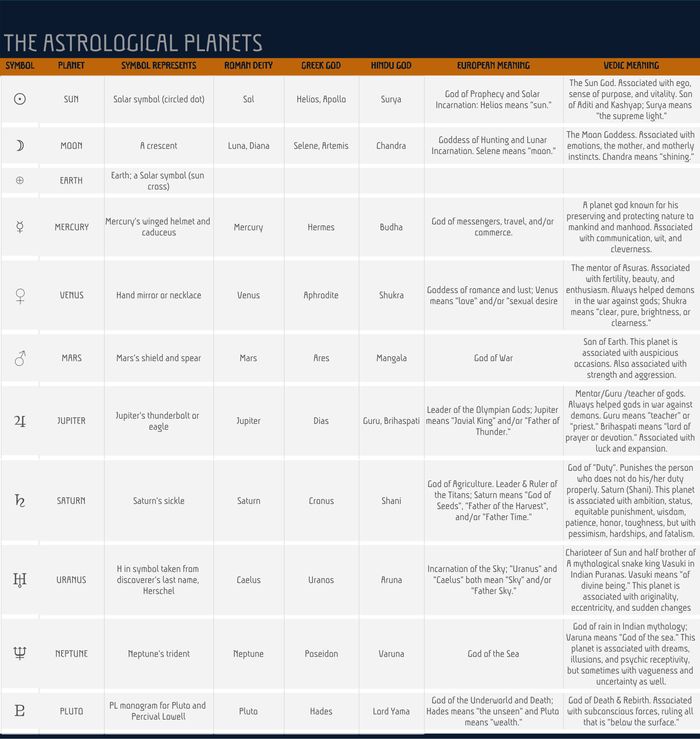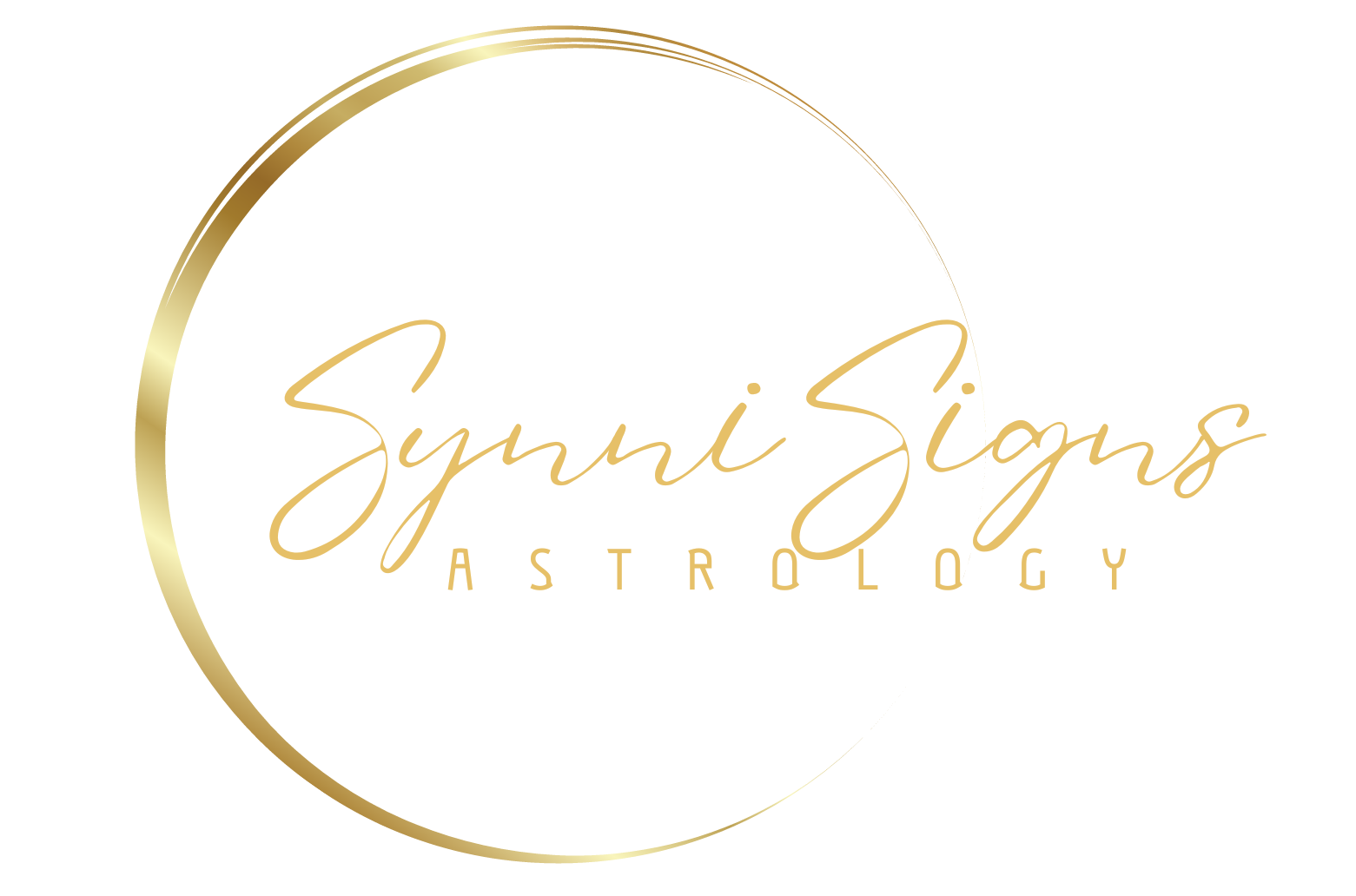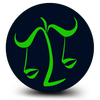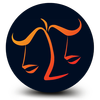
SUN

MOON

MERCURY

VENUS

MARS

JUPITER

SATURN

URANUS

NEPTUNE

PLUTO
Earth

In astrology, the concept of planets differs from their astronomical definition. Before the invention of telescopes, ancient astronomers categorized the night sky into two parts: fixed stars, which remained stationary, and “wandering stars,” or planets, which moved relative to the fixed stars over the course of the year.
Initially, ancient astronomers recognized five visible planets: Mercury, Venus, Mars, Jupiter, and Saturn, omitting Earth from the list. However, over time, the definition of planets expanded to include the Sun and Moon, resulting in a total of seven planets in astrology. These celestial bodies were thought to embody the will of the gods and directly influence human affairs.
In contemporary astrology, planets represent fundamental instincts or subconscious impulses, acting as controllers of energy distribution that symbolize diverse aspects of human experience. Their expressions vary across the twelve signs of the zodiac and the twelve houses of the horoscope. Furthermore, planets form relationships with each other through aspects.
Astrologers hold diverse perspectives on the source of correlations between planetary positions and human characteristics. Some believe that planets directly influence individuals through gravitational or other unknown forces, while others view them as mirrors reflecting universal organizing principles. This viewpoint suggests that the patterns created by the planets in the sky mirror the fluctuations of human impulses, adhering to the principle of “as above, so below.” In Chinese astrology, planets are also linked to fundamental forces of nature.
FORTUNA
The Planets in Astrology
Since ancient times, the Western astrological tradition has outlined specific meanings and domains associated with astrological planets. In Hindu astrology, these celestial bodies are known as Navagraha or “nine realms.” Chinese astrology, on the other hand, links the planets to yin and yang life forces and the five elements, integral to the practice of Feng Shui. While some consensus exists among astrologers regarding the signs that exalt each planet, there is variance in interpretation among practitioners.
|
SYMBOL
|
PLANET
|
SYMBOL REPRESENTS
|
ROMAN DEITY
|
GREEK GOD
|
HINDU GOD
|
EUROPEAN MEANING
|
VEDIC MEANING
|
|---|---|---|---|---|---|---|---|

|
SUN
|
Solar symbol (circled dot)
|
Sol
|
Helios, Apollo
|
Surya
|
God of Prephecy and Solar Incarnation: Helios means "sun"
|
The Sun God. Associated with ego, sense of purpose and vitality. Son of Aditi and Kashyap. Surya means "the supreme light"
|

|
MOON
|
A crescent
|
Luna, Diana
|
Selene, Artemis
|
Chandra
|
Goddess of Hunting and Lunar Incarnation. Selene means "moon."
|
The Moon Goddess. Associated with emotions, the mother, and motherly instincts. Chandra means "shining."
|

|
EARTH
|
Earth; a Solar symbol (sun cross)
|
|
|
|
|
In Vedic astrology, Earth is not typically considered one of the nine traditional planets, which are referred to as Navagrahas. Instead, Earth is regarded as the place from which astrological observations and calculations are made, rather than being seen as a celestial body with its own astrological significance. In Vedic astrology, the focus is primarily on the movements and positions of the other celestial bodies relative to the Earth, such as the Sun, Moon, and planets, and how they influence human life and events. Therefore, Earth itself does not have a specific astrological meaning in the context of Vedic astrology.
|

|
MERCURY
|
Mercury's winged helmet and caduceus
|
Mercury
|
Hermes
|
Budha
|
God of messengers, travel, and/or commerce.
|
A planet god known for his preserving and protecting nature to mankind and manhood. Associated with communication, wit, and cleverness.
|

|
VENUS
|
Hand mirror or necklace
|
Venus
|
Aphrodite
|
Shukra
|
Goddess of romance and lust; Venus means "love" and/or "sexual desire
|
The mentor of Asuras. Associated with fertility, beauty, and enthusiasm. Always helped demons in the war against gods; Shukra means "clear, pure, brightness, or clearness."
|

|
MARS
|
Mar's shield and spear
|
Mars
|
Ares
|
Mangala
|
God of War
|
Son of Earth. This planet is associated with auspicious occasions. Also associated with strength and aggression.
|

|
JUPITER
|
Jupiter's thunderbolt or eagle
|
Jupiter
|
Dias
|
Guru, Brihaspati
|
Leader of the Olympian Gods; Jupiter means "Jovial King" and/or "Father of Thunder."
|
Mentor/Guru /teacher of gods. Always helped gods in war against demons. Guru means "teacher" or "priest." Brihaspati means "lord of prayer or devotion." Associated with luck and expansion.
|

|
SATURN
|
Saturn's sickle
|
Saturn
|
Cronus
|
Shani
|
God of Agriculture. Leader & Ruler of the Titans; Saturn means "God of Seeds", "Father of the Harvest", and/or "Father Time."
|
God of "Duty". Punishes the person who does not do his/her duty properly. Saturn (Shani). This planet is associated with ambition, status, equitable punishment, wisdom, patience, honor, toughness, but with pessimism, hardships, and fatalism.
|

|
URANUS
|
H in symbol taken from discoverer's last name, Herschel
|
Caelus
|
Uranus
|
Aruna
|
Incarnation of the Sky; "Uranus" and "Caelus" both mean "Sky" and/or "Father Sky."
|
Charioteer of Sun and half brother of A mythological snake king Vasuki in Indian Puranas. Vasuki means "of divine being." This planet is associated with originality, eccentricity, and sudden changes
|

|
NEPTUNE
|
Neptune's trident
|
Neptune
|
Poseidon
|
Varuna
|
God of the Sea
|
God of rain in Indian mythology; Varuna means "God of the sea." This planet is associated with dreams, illusions, and psychic receptivity, but sometimes with vagueness and uncertainty as well.
|

|
PLUTO
|
PL monogram for Pluto and Percival Lowell
|
Pluto
|
Hades
|
Lord Yama
|
God of the Underworld and Death; Hades means "the unseen" and Pluto means "wealth."
|
God of Death & Rebirth. Associated with subconscious forces, ruling all that is "below the surface."
|

















































